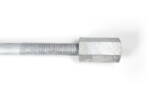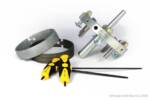Anthony's FAQs
Unfortunately there appears to be no documented information on how much rod engagement into a coupling nut is required to achieve the strength of the rod or bolt being used with it. Coupling nuts are manufactured to the same ASTM specifications as regular hex nuts, and ASME B18.2.2 provides dimensional specifications for coupling nuts. Standard coupling... Read more

ASTM F1554 does not specify whether the headed configuration is to be a standard hex pattern or heavy hex. There are three primary configurations covered by the ASTM F1554 specification which include straight rods, bent anchor bolts, and forged headed anchor bolts. Whether or not a headed anchor has a standard hex head or a heavy hex head can differ depending on the application. Since the... Read more
No, ASTM does not require a rotational capacity test for A490 structural bolts. The reason for this is that the purpose of the rotational capacity test per ASTM is to evaluate the presence and efficiency of the lubricant used in a bolt and nut combination. Lubrication is used with galvanized bolts since there is additional... Read more
There are no documented torque values for lag bolts or screws. The reason for this lies in the definition of torque when discussing threaded fasteners. To put it simply, torque is a measure of the twisting force required to spin a nut up along the threads of a bolt. Lag screw threads are driven into wood, and therefore,... Read more
In most cases, the strength of a given material used to make a fastener has strength requirements or parameters described as pounds per square inch (psi) or thousands of pounds per square inch (ksi). This is helpful when analyzing what grade of material should be used for a given application, but this doesn’t tell us... Read more
In theory, one could potentially carve out a groove that would be sufficient for fitting a shear plate or split ring. However the labor and ability to carve an exact fitting grove would be time consuming as well as tedious. All references to the proper installation of shear plates and split rings, such as the... Read more

It is known that the required grade of washer to be used with an A325 or A490 structural bolt is an ASTM F436 hardened washer, however whether or not a washer is required to be used in a given application is often brought into question. The purpose of using a flat washer with a bolt... Read more
Bolts manufactured to the ASTM A325 specification have a fixed thread length for a given diameter, which is often shorter than other grades of bolts. For example, a 3/4″ diameter A325 has 1-3/8″ of thread and a 1″ A325 has 1-3/4″ of thread, regardless of the overall length of the bolt. Our structural bolts product... Read more
Altering a bolt’s length or configuration in the field is acceptable as long as it does not change the length originally specified by the designer or engineer. If a bolt is longer than what was originally needed, the bolt can be cut down in the field. How the bolt is cut is important to consider.... Read more
A bolt that has already been used in a given application may or may not be reused, depending on the grade, application, and recommendation of the “Engineer of Record”. There are a tremendous number of conflicting opinions on this subject, but the only definitive published information we can find on this issue from a reputable... Read more

